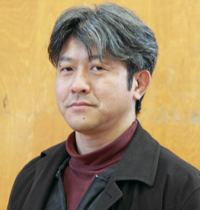Elucidation of the process of sharing objectivity
※The content is current at the time of writing.
Elucidation of the process of sharing objectivity
Research Overview

Mathematics pedagogy is not “the pedagogy of mathematics,” but rather “the study of mathematics education. In other words, it is a research field that considers the theory and practice of nurturing people through arithmetic and mathematics, fostering the qualities and abilities to think mathematically through arithmetic and mathematics learning, and contributing to human development.
*Following, “math” will include “arithmetic”.
Among them, my area of expertise is the study of mathematical communication. In order to clarify how people perceive mathematical phenomena, construct mathematical knowledge and concepts, and share mathematical objectivity through communication, I describe and analyze the individual learning process in mathematical learning situations and in the dynamic activity of teaching. The study is based on the following two aspects.
Based on the results of these studies, we will examine class composition theories that emphasize dialogue between learners and between teachers and learners, which contribute to “independent, interactive, and deep learning,” and apply them to educational practices and research of teaching materials.
Research Features
Mathematics is sometimes referred to as the language of science, where various phenomena in the natural sciences are expressed, processed, and understood mathematically. This is true not only in the natural sciences, but also in the social sciences and humanities. Research on how people perceive and utilize mathematics is very important because it will lead to the wisdom that will enable people to utilize mathematics to live better in society.
In addition, the world of mathematics is characterized by its creativity and freedom. There are not only mathematics related to numbers, quantities, formulas, and shapes, but also the mathematics of arrows (vectors), set theory, which is the mathematics of groups of things, probability theory for numbers between 0 and 1, logic, which focuses on reasoning without numbers, quantities, or formulas, and many other kinds of mathematics. There is “the sum of the interior angles of a triangle is 180 degrees” mathematics, and there is also mathematics that does not. If consistency, completeness, and independence are confirmed in a mathematical model, it is recognized as a mathematics that forms an axiomatic system.
There is no one mathematics, nor is mathematics the only absolute truth. Even things that contradict the real world are accepted in the world of mathematics. How do people perceive such mathematics? Through the study of mathematics pedagogy, we can realize once again that the creativity of mathematics is developed on the basis of people’s tolerance and generosity.
Mathematics pedagogy is unique in that it is both a humanities-oriented research that looks like a science course and a science-oriented research that looks like a humanities course.
Research Attraction
The following are two fascinating aspects of the research I am working on.
The first is, “Is mathematical knowledge/concepts really objective?” The first is the question, “Is mathematical knowledge and concepts really objective? I am sure that all of you have studied mathematics in elementary, middle, and high school. In the course of teaching, we have all participated and learned in basically the same communicative process. Moreover, even though you have studied mathematics, which is said to be a collection of objective knowledge and concepts, when you check your knowledge and concepts immediately after taking a test, you will find that each person has different knowledge and concepts that they have constructed through their study, and that they have constructed their knowledge and concepts in a rather self-serving manner. When we see this fact, we think, “Math is objective!” but the knowledge and concepts that learners construct are very subjective and personal. It is a wonder. It cannot be said that mathematical knowledge and concepts are objective. Herein lies the question and the fascination of research. I would like to clarify the process of how people change their perception of that subjective and personal knowledge/concept into objective knowledge/concept, and how they share objectivity with others.
The second is the appeal of “our research is never-ending, although we aim for an ideal. In our research, we work with students, local teachers, and children to build theories while accumulating educational practices. Our research continues, as the theories we have developed are forced to be revised and modified on a daily basis by diverse audiences, diverse events, diverse environments, diverse times, and diverse societies. It is a research in which we do not even know whether the goal exists or not, and at the same time, we can engage in research all the time while being involved with others and feeling like a young researcher all the time.
Future Outlook
Currently, we are investigating mathematics classes and learning situations to determine whether it is more effective for students to recognize and understand mathematics by actively generating discussion with others or by learning through a functioning self-initiated dialogue by listening to logical and easy-to-understand explanations.
In the future, we intend to focus on the quality of evidence necessary for understanding, both in dialogue with others and with oneself, and how to transform the perception of such evidence into objective knowledge and concepts.
Message to those who are interested in this research
Rather than simply limiting the study of mathematics to the acquisition of knowledge, skills, and other content, mathematics education is required to cultivate the foundation for creativity through mathematical activities and to contribute to the human development of all children. We need more teachers who are not merely good at “teaching mathematics,” but who can contribute to “developing people through mathematics learning” and “learning many things through mathematics learning” by reaffirming the appeal of mathematics, understanding the authentic process of learning, and believing in the potential of people.
We hope that as many people as possible will study mathematics pedagogy in the College of Education to become math and mathematics teachers who continue to correct and improve.
.png)



-1024x631.png)
